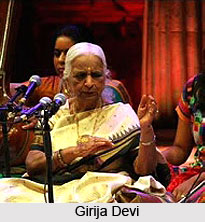 Tappa, understood to have been the staple diction of the erstwhile camel drivers, has since come to a ripened age, by being nurtured in the hands of some of the legendary masters in this genre. The word Tappa stands for jumping, bouncing and skipping, implying the extraordinary rule of unremitting attempts made by a singer on the musical notes, not stopping or taking a pause for once. This outstanding formation is unique to tappa only, absent in the other Hindustani classical forms. It is thus composed of rhythmic and rapid notes, and such a style calls for immense and extreme hold over the singing diction. A contrary to which can damage the whole recital. Tappa is very unlike khayal rendition, crisp and highly volatile in its nature. And the few exponents like Ghulam Nabi, Pt. Bholanath Bhatt or Girija Devi have thus become legends in their own right.
Tappa, understood to have been the staple diction of the erstwhile camel drivers, has since come to a ripened age, by being nurtured in the hands of some of the legendary masters in this genre. The word Tappa stands for jumping, bouncing and skipping, implying the extraordinary rule of unremitting attempts made by a singer on the musical notes, not stopping or taking a pause for once. This outstanding formation is unique to tappa only, absent in the other Hindustani classical forms. It is thus composed of rhythmic and rapid notes, and such a style calls for immense and extreme hold over the singing diction. A contrary to which can damage the whole recital. Tappa is very unlike khayal rendition, crisp and highly volatile in its nature. And the few exponents like Ghulam Nabi, Pt. Bholanath Bhatt or Girija Devi have thus become legends in their own right.It is usually held that tappa is derived from the songs and tunes sung by the camel drivers of North West Punjab. These songs were composed in Punjabi and Pusthu and, like thumri, were amatory in spirit. The word tappa is derived from the root word tap, which means to 'jump', 'bounce', or 'rebound' in the manner of a bouncing ball.
History of Tappa
History of Tappa outlines the biographical sketches included in the epic work of Indian Music, by Dr. Thakur Jaydev Singh. According to him, Shorie Miya had four significant disciples: Prasiddhu Maharaj, Miya Gammu or Gammu Khan, Tarachand, and Mir Ali Saheb, Gammu Khan's son, Sadi Khan and Babti Ramsahay. He is considered as a member of the kathaka community who together with his brother Manohar Maharaj founded the Prasiddhu-Manohar lineage. Like the other lineages of Tappa singers, this lineage asserted significant musicianship in the mainstream genres of vocal music. Prasiddhu's great-grandson, Ramkrishna Mishra taught and performed in Kolkata till 1955.
For more, visit the link below: